April 2016 Research Report on Murky Lake Land Camp
This report highlights research-related activities carried out on Denesolie Lands during April 2016. These activities were part of a three-year study called Picturing the Thelon River: Restor(y)ing Denesoline Relations en route to the headwaters, which was implemented by the Lutsel K'e Wildlife Lands and Environment Deparment (WLED), and researchers at the University of Waterloo. The purpose of this collaborative community-based study was to assist Lutsel K'e Dene in maintaining and restoring relationships with the Thelon River watershed.
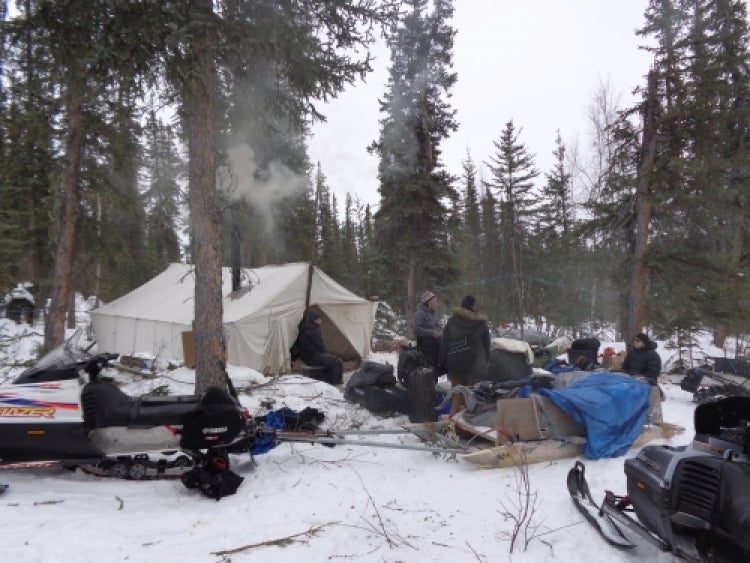
Experiencing and sharing knowledge on the land.
A final component of the study was a land camp experience that allowed Dene land users, Dene youth, and university researchers to exchange knowledge, share Thelon stories, and practice land-based skills. The initial
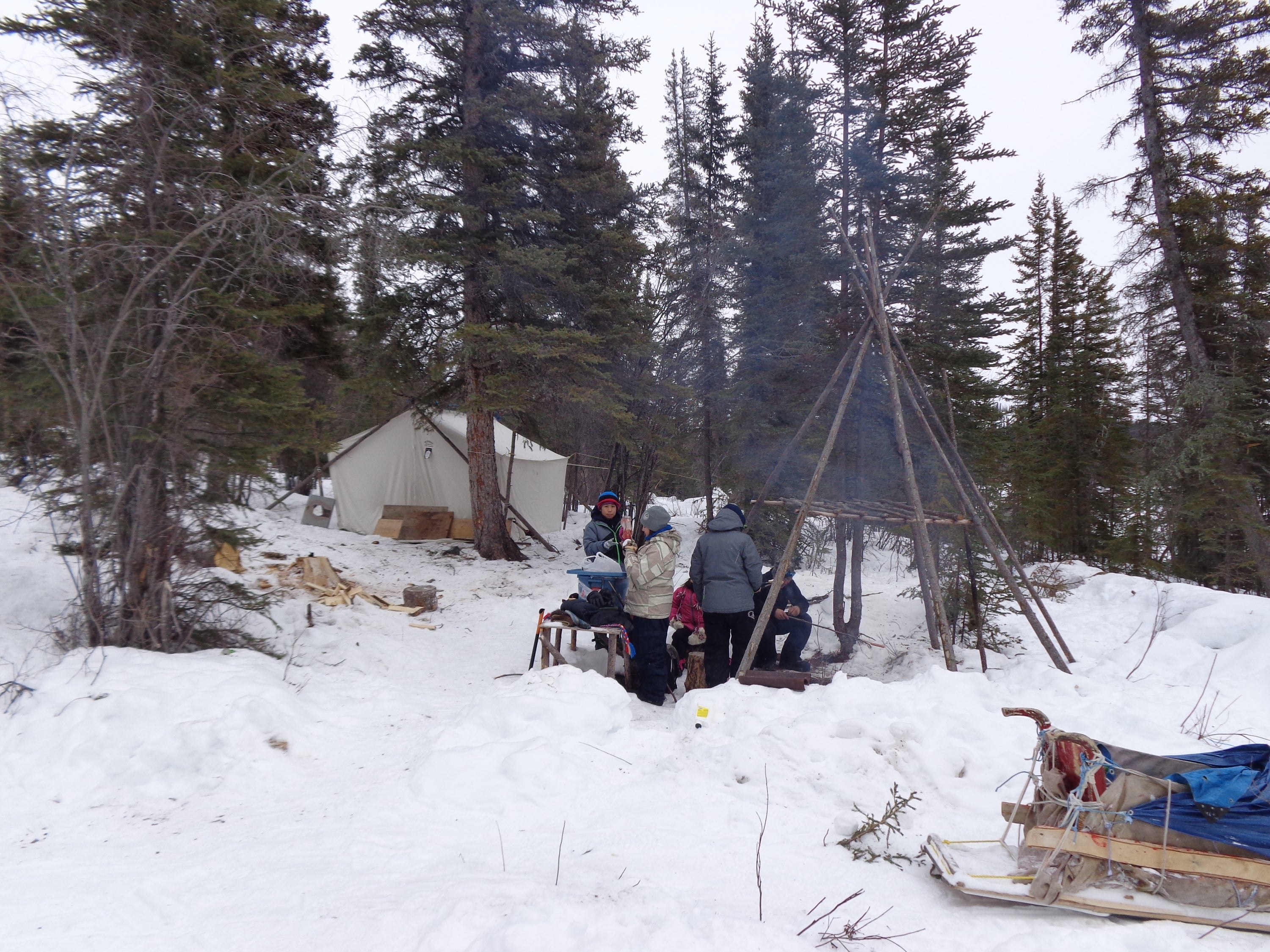
plan was to set up this land camp at Whitefish Lake, one of the Thelon River’s headwater lakes. However, this location presented several logistical challenges and was determined to be difficult to access. After further consultations among the WLED, Terri Enzoe, the Lutsel K’e Dene Education Authority, and university researchers, it was agreed to integrate the Thelon land camp with the annual land and culture camp run by the Lutsel K’e Dene School. The land camp was located at Murky Lake and took place from April 07 - April 12, 2016. University researchers involved were Bryan Grimwood (project lead, University of Waterloo) and Cameron Baldassarra (research assistant, McMaster University), who were guided by land-users Terri Enzoe, Pete Enzoe, and Kyle Enzoe.
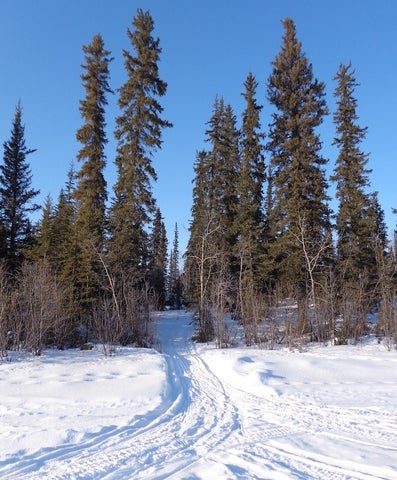
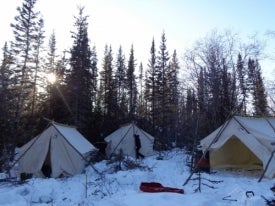
Setting up camp at Murky Point
Point mid-afternoon on April 8. The group focused on finishing camp set up. This included cutting and collecting firewood, laying spruce boughs for insulation and padding on tent floors, heating tents, and setting up food storage and kitchen areas. Over the next five days, land users and Elders shared traditional knowledge and assisted other land camp participants in learning and practicing land-based skills. Specific activities included:
- Muskoxen scouting trips by snowmobile (while tracks, scat, and other signs were observed, no muskoxen were encountered; Kyle and Pete Enzoe agreed that the muskoxen were high up on the hills as it was nearing calving season);
- Setting fishing nets beneath the ice on Murky Lake, and checking these on a daily basis (Ernest Boucher and several land camp workers demonstrated ice cutting techniques and how to set netsusing a jigger);
- A Sunday morning service held in Terri Enzoe’s tent and involving all land camp participants;
- Cleaning and smoking Lake Trout, Whitefish, and Mariah harvested from Murky Lake;
- Setting and monitoring muskrat traps along portage trails and marsh areas.
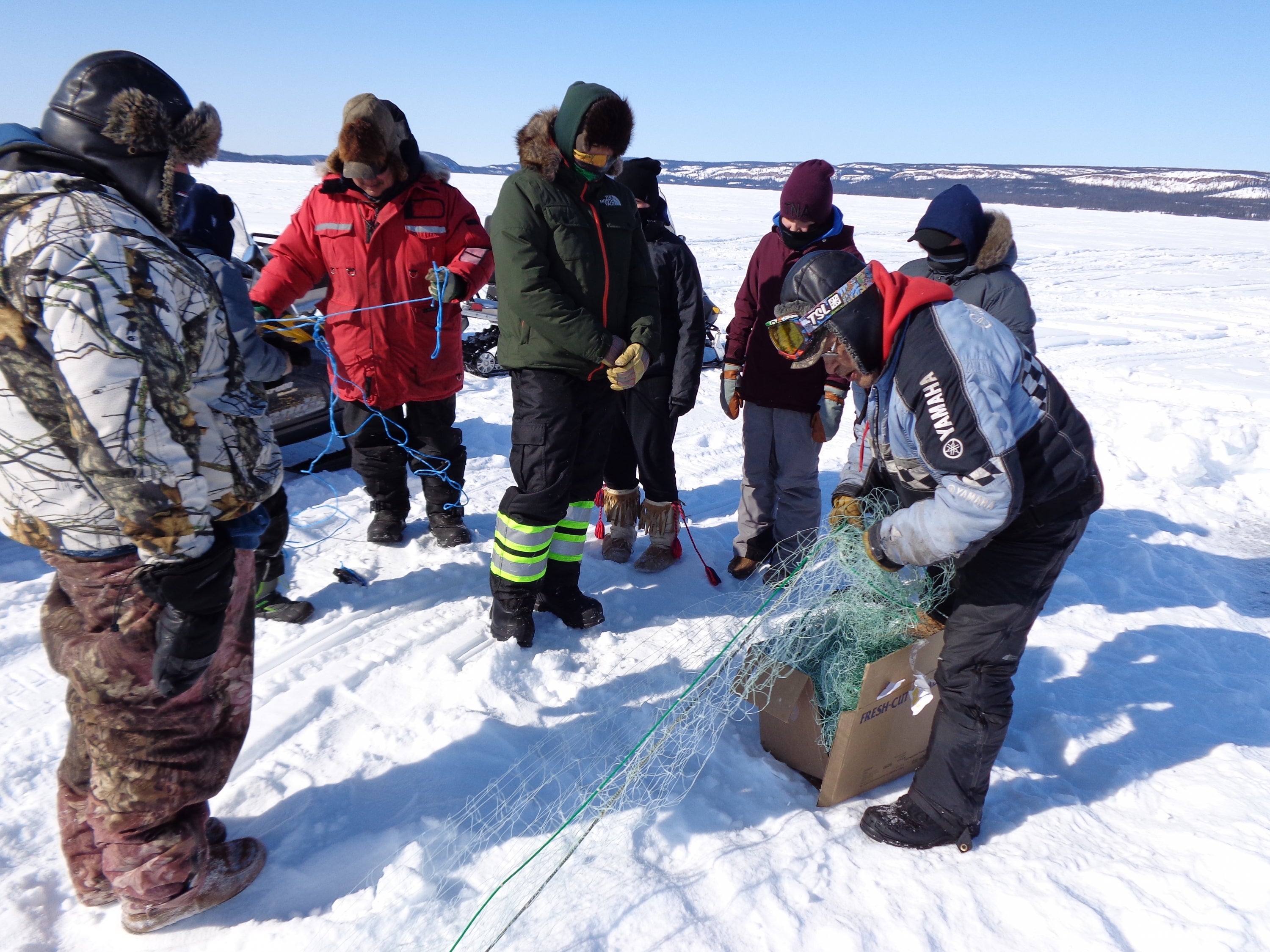
Setting nets for Lake Trout and Whitefish
On the final evening of the land camp, James Marlow arranged a meeting in which Bryan Grimwood was invited to share Thelon River stories and knowledge that had been documented during previous research activities with Lutsel K’e community members. The meeting occurred in Terri Enzoe’s tent. Twelve youth, three elders and land users, and two university researchers were present. Bryan Grimwood began by describing the overall Thelon project, including its purpose, objectives, how it developed, and its involvement of Lutsel K’e Dene, Inuit in Baker Lake, Nunavut, and canoe tourists from the south. Several excerpts taken from stories told by Lutsel K’e Dene were shared with the group. These prompted questions from youth and additional stories to be told by land users and Elders.
“I want to leave my words for my great grandchildren. These stories that I’m telling you, are wesaving it for our young people or the next generation, so they’ll keep this story. It will last.” - Madeline Drybone
“You know, best part of it was just being on the river and paddling down, and seeing everything. Youknow, it really gave me a good understanding of what we have out there. And it's definitely worth fighting for, worth keeping, and just being untouched, you know. Just leaving it the way it is.” - Damien Kailek
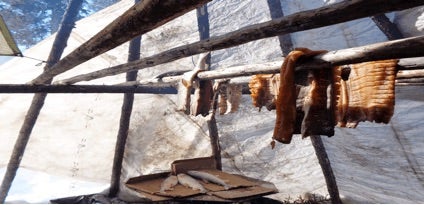
>Smoking fish in the teepee
Tuesday, April 12 was the final day of the land camp. Traps were checked, fish nets were removed, tents were packed up, and sleds were loaded. Land camp workers and participants made their way back to Lutsel K’e by early evening. The following night, two movies about the Thelon River were shown in the community hall. This event brought together several community members, including many of the land camp workers and participants, to learn more about the Thelon and celebrate Denesoline relationships to this sacred place.
“The land is my pillow. I sleep on it. And it feeds me. I also drink the water from it. The trees will make me my home if I cut the logs. I always think of that whenever I travel. I also pay lots of tobacco to the land to have a safe travel. A safe travel there and a safe travel home. And also I threw spruce boughs on the lake. Just like to have a good journey. Those are the ones I learned from the Elders that are not living here today. And I still do it today, whenever I go out.” - Terri Enzoe
Thank you to those members of the Lutsel K’e community who have welcomed and participated in this research. Special thanks Terri Enzoe, James Marlow, Lauren King, Sean Magee, the Lutsel K’e WLEC, the Lutsel K’e Dene Education Authority, and the Lutsel K’e Dene School. This report was prepared by Bryan Grimwood and Cameron Baldassarra, September 2016.
Masi cho! Thank you!
Questions or comments about his report? Please contact:
Bryan Grimwood
Department of Recreation and Leisure Studies
University of Waterloo
200 University Avenue W., Waterloo On N2L 3G1
bgrimwood@uwaterloo.ca